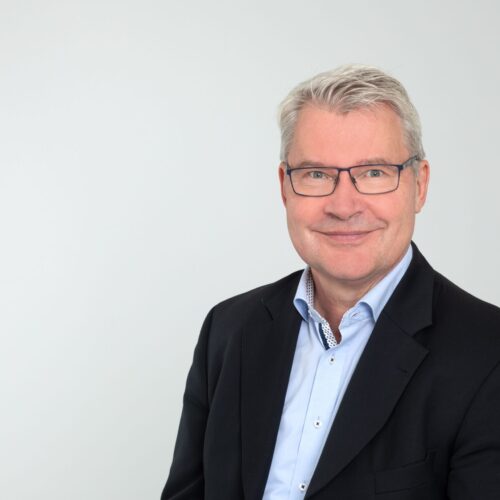- Prof. Dr. Klaus Pantel
CV
Prof. Dr. Klaus Pantel is Director of the Institute of Tumor Biology at the University Medical Center Hamburg-Eppendorf, Germany. The Institute is part of the Center for Experimental Medicine and the University Cancer Center (UCCH). Prof. Pantel graduated from the University of Cologne in 1986 and completed his dissertation in 1987 in the field of mathematical models of hematopoiesis. After his postdoctoral training in the USA at Wayne State University, Detroit, where he conducted research on hematopoietic stem cell regulation, he spent 10 years at the Institute of Immunology at the University of Munich, where he habilitated in 1995 in the field of experimental immunology and immunotherapies. Prof. Pantel’s pioneering work in the field of micrometastasis and liquid biopsy (analysis of tumor components in the blood, e.g. circulating tumor cells and circulating nucleic acids (ctDNA, microRNAs)) of solid tumors is reflected in more than 600 publications (h-factor 161) in excellent high-ranking biomedical and scientific journals (incl. NEJM, Lancet, Nature Journals, Cancer Cell, Science Translational Medicine, Cancer Discovery, PNAS, JCO, JNCI, Cancer Res.). His research work has been recognized by the AACR Outstanding Investigator Award 2010, the German Cancer Award 2010, and four ERC Grants, among others. He is the Founder and current President of the European Liquid Biopsy Society (www.elbs.eu) and the Scientific Coordinator/Lead-PI of the EU consortia PANCAID (https://pancaid-project.eu/) and GUIDE-MRD (www. https://www.guidemrd-horizon.eu/).
Prof. Dr. Klaus Pantel is Director of the Institute of Tumor Biology at the University Medical Center Hamburg-Eppendorf, Germany. The Institute is part of the Center for Experimental Medicine and the University Cancer Center (UCCH). Prof. Pantel graduated from the University of Cologne in 1986 and completed his dissertation in 1987 in the field of mathematical models of hematopoiesis. After his postdoctoral training in the USA at Wayne State University, Detroit, where he conducted research on hematopoietic stem cell regulation, he spent 10 years at the Institute of Immunology at the University of Munich, where he habilitated in 1995 in the field of experimental immunology and immunotherapies. Prof. Pantel’s pioneering work in the field of micrometastasis and liquid biopsy (analysis of tumor components in the blood, e.g. circulating tumor cells and circulating nucleic acids (ctDNA, microRNAs)) of solid tumors is reflected in more than 600 publications (h-factor 161) in excellent high-ranking biomedical and scientific journals (incl. NEJM, Lancet, Nature Journals, Cancer Cell, Science Translational Medicine, Cancer Discovery, PNAS, JCO, JNCI, Cancer Res.). His research work has been recognized by the AACR Outstanding Investigator Award 2010, the German Cancer Award 2010, and four ERC Grants, among others. He is the Founder and current President of the European Liquid Biopsy Society (www.elbs.eu) and the Scientific Coordinator/Lead-PI of the EU consortia PANCAID (https://pancaid-project.eu/) and GUIDE-MRD (www. https://www.guidemrd-horizon.eu/).
ABSTRACT
Klaus Pantel
Institute of Tumor Biology, University Cancer Center Hamburg, University Medical Center Hamburg-Eppendorf, Hamburg, Germany; Chairman, European Liquid Biopsy Society (ELBS), [email protected]
Tracing tumor evolution by liquid biopsy has opened new avenues for personalized medicine. In particular, circulating tumor cells (CTCs), circulating tumor-derived DNA fragments (ctDNA) and extracellular vesicles have received enormous attention as new circulating biomarkers and subject of translational research (Pantel & Alix-Panabieres, Nature Rev. Clin. Oncol. 2025; Alix-Panabieres & Pantel, Cancer Cell and Cancer Discovery 2025). Liquid biopsy research has opened new avenues for a better understanding of tumor biology in cancer patients, including intra-patient heterogeneity and evolution towards resistance to therapy. Clinical applications include early cancer detection, improved cancer staging, early detection of minimal residual disease/relapse, real-time monitoring of therapeutic efficacy and detection of therapeutic targets and resistance mechanisms. In particular, interventional clinical studies are required to demonstrate clinical utility of liquid biopsy as an important prerequisite for the introduction of this new diagnostic approach into clinical practice. Moreover, assay harmonization and standardization as conducted by international consortia like the European Liquid Biopsy Society (ELBS; www.elbs.eu) is essential. Here, I will discuss a conceptual framework of liquid biopsy assays and point out current challenges of liquid biopsy research, which might structure this dynamic field of translational cancer research.

